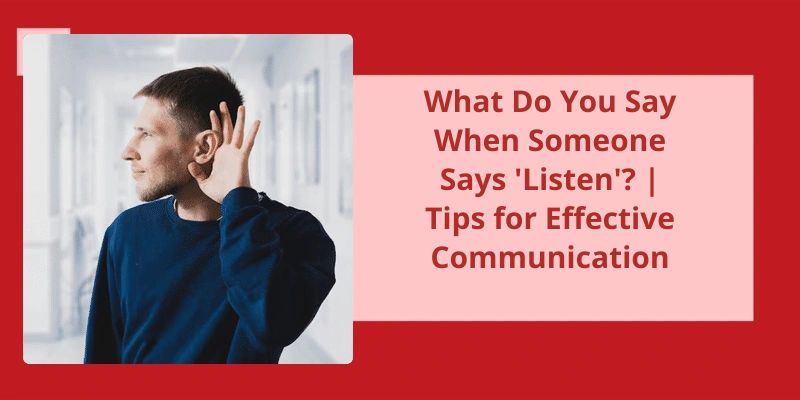When someone says "listen," it often indicates that they’ve something important or significant to say. It’s a signal to pay attention, and to be fully present in the moment, focusing solely on what the speaker is sharing. Responding to this cue requires more than a simple acknowledgement. One must actively engage in the conversation, demonstrating an openness and willingness to hear the other person's thoughts and feelings. The proper response could depend on the situation and the relationship between the individuals, but it should always convey a level of respect, curiosity, and willingness to listen with an open mind. Simply put, "listen" is a call to connect and communicate, and the response should reflect a desire to do just that.
Do You Listen to Hear or Respond?
This quote is emblematic of a pervasive issue in our society: we often prioritize our own voices and opinions over understanding and compassion for others. This mindset can lead to many problems, including misunderstandings, conflicts, and a lack of empathy in our relationships with others. Listening to hear, rather than simply responding, is instrumental in avoiding these negative consequences.
When we listen with the intent to hear, we approach conversations with an open mind and a willingness to truly understand what the other person is saying. This means setting aside our own biases and preconceptions, and actively engaging with the speakers ideas and perspective. By doing this, we can gain a greater appreciation for the experiences and feelings of others, fostering deeper connections and relationships.
On the other hand, when we listen with the intent to respond, we may miss out on important details or context, and may even dismiss the other persons feelings or perspectives altogether. This can create tension and misunderstandings, further exacerbating existing conflicts or issues. Furthermore, by prioritizing our own voices and opinions, we miss out on the valuable insights and perspectives of others, reducing our collective capacity for growth and learning.
Ultimately, listening to hear requires a deeper level of engagement and empathy than simply responding. It requires us to be present, attentive, and receptive to the words and feelings of others. And while it may take more effort and intentionality, the rewards of listening to hear are immeasurable: greater understanding, connection, and compassion in our personal and professional relationships.
In order to truly listen to hear, we must practice active listening skills such as paraphrasing and clarifying, as well as identifying and addressing our own biases and perspectives. We must also cultivate a mindset of curiosity and openness, seeking to learn and understand rather than immediately jumping to judgment or criticism. By doing so, we can break down barriers and foster more meaningful and productive relationships with those around us.
By prioritizing active listening and setting aside our own biases and preconceptions, we can create more meaningful and fulfilling relationships with those around us, beginning with a deeper appreciation for the diverse perspectives and experiences of others.
Strategies for Practicing Active Listening in Personal and Professional Relationships
Active listening is a crucial skill in both personal and professional relationships. To practice active listening, it’s important to give your undivided attention, ask clarifying questions, and provide feedback to the speaker. Additionally, maintaining eye contact, staying focused, and avoiding distractions can also aid in active listening. These strategies can help improve communication, build trust, and strengthen relationships.
The act of listening is a fundamental aspect of human interaction. It involves the process of actively receiving and interpreting information from the sender. When someone says listen, it implies that they want the listener to focus their attention on the conversation or message being conveyed. However, the context and tone of the speaker can also give additional meaning to the word listen.
What It Means When Someone Says Listen?
Listening is a fundamental aspect of communication. It requires attentiveness, focus, and an open mind. When someone says listen, they expect you to take the time to absorb what they’re saying, not just hear the words. They want you to understand and connect with them and the message they’re conveying.
Another reason why listening is essential is that it fosters deeper relationships. This builds trust, which is essential in any relationship. Furthermore, listening helps us avoid misunderstandings and conflicts. By truly understanding the person we’re communicating with, we can prevent miscommunications that could lead to larger issues.
However, listening isn’t always easy. It requires effort and discipline, particularly when we’re distracted or preoccupied. It also involves setting aside our egos and biases to truly hear someone out. Nevertheless, the benefits of listening are well worth it. When we listen to others, we gain new perspectives and insights, which can broaden our understanding of the world.
This phrase can be used to grab someone’s attention and emphasize the importance of what you’re about to say. However, there are various opinions on it’s effectiveness and appropriateness in different situations. Let’s explore why people start sentences with “Listen” and whether it’s a useful conversational strategy.
Why Do People Start Sentences With Listen?
It’s often used as a signal that the speaker is about to impart important information that needs to be heard and carefully considered. It could also be used to draw attention to something that the listener may have missed or may not be aware of. The tone in which “Listen” is used can range from gentle and persuasive to aggressive and confrontational.
It’s also worth noting that the use of “Listen” is often influenced by cultural and regional factors. Some cultures tend to place more emphasis on direct and forceful communication, while others may have a more indirect and diplomatic style. People from different regions may also have different linguistic preferences when it comes to starting a sentence with “Listen”.
It’s also possible that some people use “Listen” as a way to establish authority or assertiveness in a conversation. By starting off with this word, the speaker may be attempting to position themselves as the one in charge or as someone who should be taken seriously. In some cases, this could be an effective tactic, but in others, it may come across as overly aggressive or off-putting.
Another reason why people may start sentences with “Listen” is to grab the listeners attention and keep it focused on the topic at hand. In a world full of distractions and short attention spans, it can be challenging to get someone to listen and engage in a conversation. By using this word, the speaker is signaling that what they’ve to say is important and demands attention.
Whether it’s meant to emphasize an important point or assert authority, or simply to grab attention, the use of this word is likely to continue as a common feature of spoken language for the foreseeable future.
However, listening isn’t just about nodding your head and agreeing with someone’s point of view. It’s a complex communication skill that involves actively engaging with the speaker and processing what they’re saying. In this article, we’ll explore why listening is essential, how to become a better listener, and the benefits of active listening in different aspects of life.
What Does It Mean When Someone Says You’re Not Listening?
However, this assumption is flawed. Listening goes beyond seeing things from someone elses perspective. It involves paying attention to the words being spoken, understanding the emotions behind them and responding appropriately. It’s not enough to just nod in agreement or say “yes” without truly comprehending the message being conveyed.
When someone says “youre not listening”, they could be feeling frustrated or ignored. People want to feel heard and like their opinions matter. If they feel like theyre not being listened to, it can be demoralizing and feel like their thoughts and feelings are being dismissed. It’s important to actively pay attention when someone is speaking and make sure they feel acknowledged.
It’s also worth considering the context in which the phrase is being used. It’s possible that the speaker is being overly critical or unreasonable in their expectations. In these situations, it’s important to communicate clearly and establish boundaries. It’s perfectly acceptable to disagree with someone or have a different opinion, and this should be conveyed in a respectful manner.
Maybe there’s a miscommunication or the speaker is unable to articulate their thoughts in a clear and concise manner. It’s important to ask questions and seek clarification to ensure that the message is fully understood.
Finally, it’s important to recognize that good listening skills are essential in all aspects of life, from personal relationships to professional settings. Listening involves more than just hearing words; it involves actively engaging with the speaker and demonstrating your understanding and empathy. By doing so, you can build stronger relationships and create a more productive and harmonious environment. So, next time someone tells you “youre not listening”, take a step back, reflect on your behavior and make a conscious effort to listen more actively.
Strategies for Improving Listening Skills
Strategies for improving listening skills include active listening, focusing on the speaker, avoiding distractions, practicing mindfulness, and asking clarifying questions.
Now that we’ve established the definition of listening, understanding, and responding, it’s important to delve deeper into the concept of listening to respond. This involves not just hearing what the other person is saying, but also formulating a response in your mind while they’re still speaking. However, this approach can sometimes hinder communication and understanding. Let’s explore the advantages and disadvantages of this listening style.
What Is the Definition of Listening to Respond?
One key aspect of listening to respond is the ability to actively engage in the conversation. This means giving your full attention to the speaker and asking clarifying questions when needed. It also involves being aware of your own biases and assumptions that might limit your ability to truly understand and respond to the speakers perspective.
This involves putting yourself in the other persons shoes and trying to understand their feelings and experiences. Empathy can help to build trust and rapport with the speaker, which in turn can lead to more honest and open communication.
Listening to respond also requires a certain level of patience and self-control. It can be tempting to jump in with your own thoughts and opinions, but this can derail the conversation and prevent you from truly listening to the speaker. Instead, it’s important to take a step back and allow the speaker to fully express themselves before responding.
In order to effectively listen and respond, it’s also important to be aware of your own emotional state. If you’re feeling defensive or angry, for example, this can make it difficult to truly listen to what the speaker is saying. By recognizing your emotions and taking steps to manage them, you can become a more effective listener and responder.
Finally, listening to respond also involves taking action based on what you’ve heard. This might involve making changes to your own behavior or mindset, or it might involve advocating for change on a larger scale. Whatever the case may be, it’s important to follow through on your commitments and show that you’re truly invested in understanding and responding to the needs of others.
Tips for Improving Listening Skills and Becoming a Better Listener
Improving your listening skills involves actively engaging with the speaker by making eye contact, paying attention, and avoiding interrupting or jumping to conclusions. Ask questions, summarize what was said, and show empathy to demonstrate that you’re truly listening. Practice these skills regularly to become a better listener.
Source: Listening, Understanding and Responding | My HR
Communication is one of the most essential aspects of our lives, and being able to listen effectively is at the forefront of it. Unfortunately, there are instances when someone might accuse us of not listening, leaving us feeling misunderstood or frustrated. In this article, we’ll explore some of the best ways to respond when someone claims you’re not listening. So, let’s dive in!
What to Say When Someone Says You Never Listen?
You can start by summarizing what they just said to confirm that you’ve heard them. Repeat their words back to them in your own words to make sure you understand what they’re trying to convey. This shows that you’re actively listening and making an effort to comprehend what they’re saying.
Another way to show that you’re listening is to ask questions. Clarifying questions like “Can you explain that in more detail?” or “What do you mean by that?” demonstrate that you’re interested in what they’re saying and are genuinely trying to follow their line of thought.
It’s important to maintain eye contact and use body language that shows you’re engaged in the conversation. Avoid checking your phone or looking off into the distance, as this gives the impression that you aren’t engaged with what they’re saying.
It’s also important to avoid interrupting them, as this can be seen as disrespectful and can make the other person feel like you aren’t valuing their input. Wait for them to finish speaking before responding, and make sure you aren’t monopolizing the conversation. Show that you’re willing to have a two-way dialogue.
At the same time, don’t be afraid to express your own thoughts and feelings. It’s possible that the other person doesn’t feel like youre listening because they feel like youre not weighing in enough. Sharing your own perspective can help to validate their feelings and create a more meaningful conversation.
The most important thing is to be genuine in your interactions. If you’re truly interested in what the other person has to say, it will show in your body language, eye contact, and the questions you ask. Conversely, if you’re just going through the motions, the other person will sense it and be less likely to see you as a good listener. So take the time to really engage with the other person and be open to what they’ve to say. You might be surprised at how much you can learn from them.
Conclusion
In conclusion, the act of listening is a foundational aspect of effective communication and interpersonal relationships. When someone says "listen," they’re asking for your attention and presence in the moment. Responding to this request requires a genuine willingness to be present and engaged, actively hearing what the speaker is sharing. Similarly, it's important to not only listen, but to also provide feedback and engage in dialogue. By doing so, we can build trust, strengthen connections, and foster understanding. Therefore, the power of listening should never be underestimated, as it can lead to meaningful and impactful interactions in both personal and professional settings.






